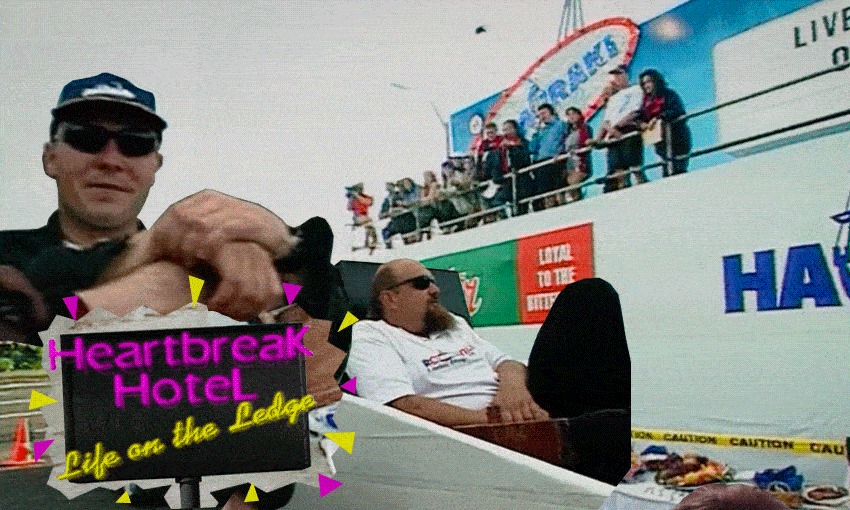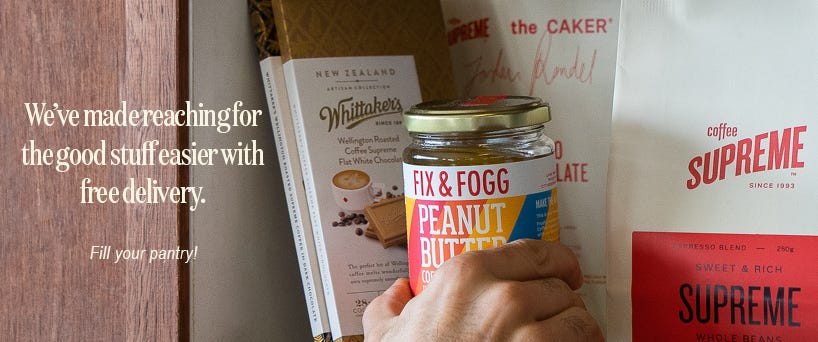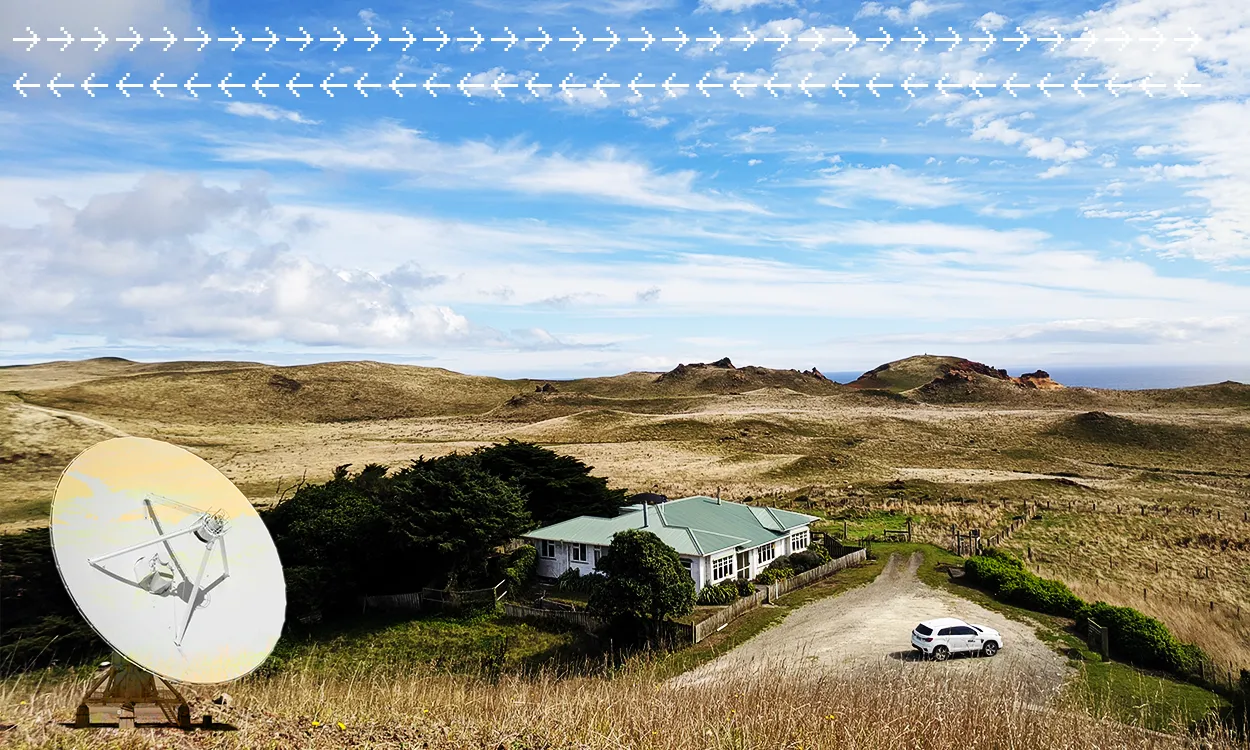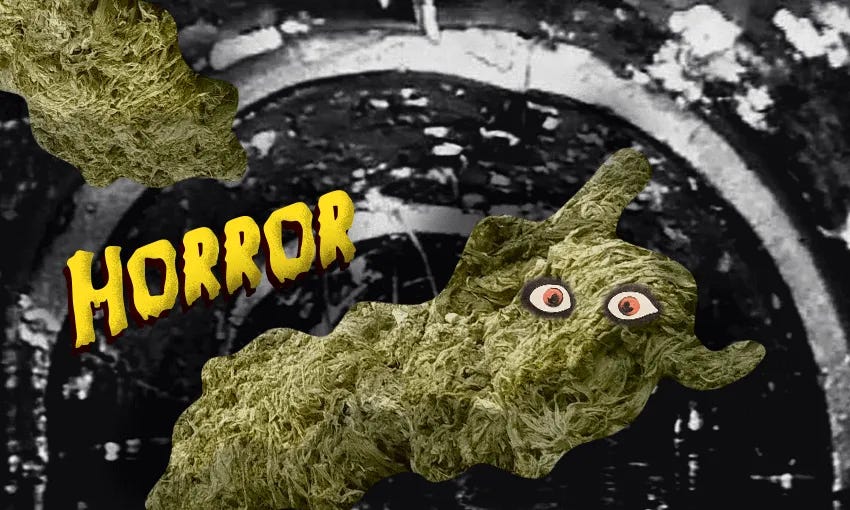When a radio promotion goes wrong
Twenty-five years ago, 10 New Zealanders climbed onto a ledge to take part in a Radio Hauraki promotion. Six months later, some of them were still there...
Kia ora and welcome to The Spinoff Weekend. It’s Saturday, June 11, and I have some news. I’ve loved wrapping up the week’s biggest headlines for you over the past six months. From next week, I’m departing this newsletter to start another one (more on that soon). So, my Spinoff colleague Shanti Mathias is taking over. You’re in a safe pair hands: she subscribes to more Substacks than I ever knew existed, and can pen a hell of a good story to boot (seriously, go read about her night at this chaotic NFT party). You’ll see Shanti’s vibe — she’s far cooler than me — filtering in from today, and I’m looking forward to seeing what she does with it. It might not be my name on it, but I’ll still be kicking off my Saturday mornings right here, along with a freshly brewed cup of Coffee Supreme. As always, it’s the perfect start to the weekend…
-Chris Schulz, senior writer (and Shanti Mathias, staff writer)
‘A weird spectacle of human determination’
Linda Buhagiar packed her guitar. Rodney Elliott took his Game Boy. Dave Herlihy loaded up with a small fridge, and Rochelle Allport crammed in two umbrellas, a portacot and a tarpaulin. In 1997, they joined a group of 10 people who climbed onto a platform in central Auckland and took their positions on a “living billboard” as part of a unique Radio Hauraki promotion. The winner would be the last person standing, and at stake was $20,000, a huge amount at the time. But the promotion didn’t go to plan, and nearly six months later, three contestants were still there, battling a radio station suffering flagging enthusiasm for what it started. One contestant says it felt like “a progressive decline towards insanity”. How did it end, and why has the competition resurfaced now, 25 years on? Read all about it here. /CS
If you’re looking for more TV nostalgia, Three’s Match Fit challenges 10 rugby legends to confront their health — including the late Va’aiga Tuigamala.
Big wins for shoppers in supermarket shake-up
New Zealand’s sky high grocery prices are on everyone’s minds right now, including ours — that’s why we launched our incredible cheese price tracker. The good news? Change is coming. The government has announced a raft of changes aimed at making grocery prices both more affordable and understandable. “The duopoly needs to change,” says consumer affairs minister David Clark. The bad news? It could take a while. In one of The Spinoff’s most popular stories this week, our resident supermarket guru Jacob Flanagan takes a look at the government’s latest announcements, and what they might mean for you when you arrive at the till. /CS
When a Facebook post about a struggling supermarket owner went viral, the internet reacted, in good ways, and bad. Duncan Greive rides the rollercoaster.
Why the internet matters in the Chatham Islands
The internet is really great if you live in an urban area with a near-constant, speedy connection. But in the Chatham Islands, 800 kilometres east of the rest of New Zealand and home to 600 people and many rare birds, the convenience of the internet is hard-won — and still not that fast. I went to the Chatham Islands in March to talk to residents about what that connection means to them. One thing I wish I’d been able to include in my final story? A quote from a fisherman who identified himself only as “Sticks” who said his favourite thing about the internet is being able to Snapchat pictures of his catch to the lads. If you need to recover from Chris’s hectic investigation into Radio Hauraki’s billboard competition, escape to the large, quiet skies of the Chathams. /SM
A message from senior writer Alex Casey: Earlier in the year we published When the Lessons End, an in-depth examination of one woman’s experience at the hands of her private music teacher, and the impact it had on the rest of her life. Stories like these take months of rigorous reporting, travel costs and hefty legal fees to get to publication stage, all of which was only possible thanks to our members. I feel so lucky to work for an organisation that encourages long-form investigative journalism, but the reality is that this work is impossible without the ongoing support of our readers. If you can, please support our work by donating today.
Is this why National is winning?
Political polls are designed to generate headlines and analysis, an ever-present reminder that in a democracy, national politics is, at its most basic level, a competition. Toby Manhire looks at the latest Ipsos poll, which asks voters which party they think can best respond to the big problems facing society. A year ago, Labour was the preference on every single issue. Now National is preferred by many voters. Could it be the revamped image of the party under leader Chris Luxon? /SM
What did Jacinda Ardern’s US trip achieve? And now that she’s back, what are the polls telling her? This week’s episode of Gone By Lunchtime unpacks it all.
Once you’ve met a rag monster, there’s no going back
It’s like something out of Wellington Paranormal. Over the last few weeks, Wellington Water has regularly been documenting “rag monsters” found in the city’s sewage pipes in an effort to encourage the city’s flushers to desist flushing unflushable items. Sam Brooks, in a piece both horrifying and informative, talks to a water engineers about the phenomenon. “I think there’s an obsession with seeing how the proverbial sausage is made, but we don’t think about where that sausage goes – we literally flush and walk away,” Sam told me, when I asked him why rag monsters and “fatbergs” are so compelling. He hopes his piece puts a stop to the possibility of sentient rag monsters emerging across the country. You can read that story here. /SM
Everything else we loved reading this week…
Here’s the RNZ Chris Luxon profile everyone has thoughts and feels on.
Reweti Kohere writes about why the New Zealand Aids Foundation is renaming itself, diving into queer history, the science of disease transmission, and moral panics around HIV along the way.
Are sit-ups dead? The Atlantic’s Amanda Mull covers fitness trends, avoiding back pain, and how the military gets its sticky fingers into everything.
Beyond the optics of a damp UN address, what sea level rise means to Tuvalu’s foreign minister.
For The Spinoff, Murdoch Stephens writes that being a teenager is maybe great, actually.
Charlotte Muru-Lanning on who gets harmed when the government messaging says to ‘look after yourself’.
For American politics obsessives, here’s an excellent interactive from the New York Times on what exactly happened on January 6.
The Guardian’s Alex Hern had his identity stolen by a cryptocurrency desperate to look legitimate.
One of the Ingham twins died this week. Thirty years ago, their story captured New Zealanders’ imaginations. Linda Burgess unpacks their enduring legacy.
Finally, if you’re looking for something to soundtrack your weekend, head over to Stereogum and pick something from their list of the 50 best albums of the year so far. Here’s our favourite, from Angel Olsen. Enjoy!










